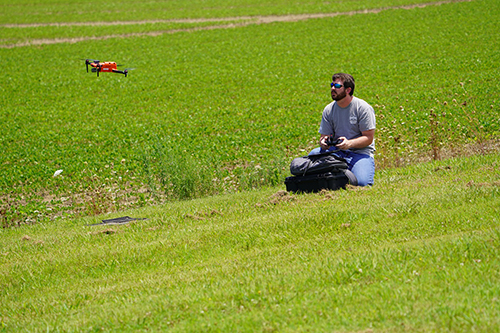MSU, Kansas State, NIST partner for UAS search and rescue competition

Cavin Skidmore, a flight operations technician at MSU’s Raspet Flight Research Lab, launches an unmanned aircraft system at the university’s R.R. Foil Plant Sciences Research Center, known by many as North Farm. PHOTO: Chris Bryant | Raspet
Participants are invited to compete for up to $720,000 in prizes in an unmanned aircraft system design and build challenge co-managed by a Mississippi State University flight laboratory.
The U.S. Department of Commerce’s National Institute of Standards and Technology, known as NIST, is hosting the competition to advance the use of unmanned aircraft systems in first responder search-and-rescue operations. Known as the First Responder UAS Triple Challenge, the contest is managed by Kansas State University, in partnership with MSU’s Raspet Flight Research Laboratory.
NIST’s Public Safety Communications Research, or PSCR, division will accept contest entries beginning Aug. 2, 2021, with multiple stages running through June 2022.
“Our goal at PSCR is to accelerate the development and adoption of advanced wireless communications for the public safety community,” said Dereck Orr, division chief. “These prize competitions are a way for us to find solvers from around the world to help us with this important research.”
Prize recipients will be determined by a panel of judges, assisted by a team of subject matter experts, through each stage of the competitions. To learn about eligibility requirements, visit challenge.gov, and for additional information about the challenge and to register, visit uastriplechallenge.com.
“Unmanned aircraft systems are increasingly revolutionizing various aspects of society, including how emergency responders do their jobs,” said Tom Brooks, MSU Raspet director. “Mississippi State welcomes the opportunity to bring our UAS experience to support this competition that is sure to advance technologies available to public safety professionals.”
The competition is comprised of three challenges with three different focus areas—all aimed at advancing UAS technology to support critical, lifesaving missions:
-- The FastFind: UAS Search Optimized Challenge is focused on search and rescue operations using optical sensors and data analysis to improve image detection and location.
-- The LifeLink: UAS Data Relay Challenge is centered on supporting continuous delivery of broadband data in a degraded cellular area.
-- The Shields Up! Securing UAS Navigation and Control Challenge asks participants to identify cybersecurity threats and countermeasures to prevent navigation and control of the UAS.
The UAS Search Optimized and the UAS Data Relay events will both culminate with live flight competitions in Starkville during the week of June 20, 2022, weather permitting.
“This project has been a long time in the making for our team at K-State,” said Kurt Barnhart, who is leading the K-State contract team. “We are privileged to be able to partner with the challenge team at NIST in their ongoing effort to push innovative technologies forward for first responders to use as they work tirelessly to help us when we need it the most. We’re also excited to be working jointly with the excellent team at Mississippi State University’s Raspet Flight Research Laboratory to develop and deliver three competitions.”
The First Responder UAS Triple Challenge offers participants the chance to use their ingenuity and hardware-building expertise to meet public safety’s needs.
NIST promotes U.S. innovation and industrial competitiveness by advancing measurement science, standards and technology in ways that enhance economic security and improve quality of life. To learn more about NIST, visit NIST.gov.
Kansas State University’s Polytechnic Campus is home to its Unmanned Aircraft Systems program which is a national leader in the unmanned aviation field and provides many engagement and education opportunities.
MSU’s Raspet Flight Research Laboratory is the nation’s leading academic research center dedicated exclusively to the advancement of Unmanned Aircraft Systems. Raspet is the only institute in the world designated both as the FAA’s UAS Safety Research Facility and as official UAS Test Sites for both the FAA and the Department of Homeland Security. Home to a fleet of the largest and most capable unmanned aircraft in academic use, Raspet conducts UAS research on behalf of federal agencies and commercial industry alike, and it remains a world leader in composite material research.
MSU is Mississippi’s leading university, available online at www.msstate.edu.
Chris Bryant | Raspet Flight Research Laboratory



